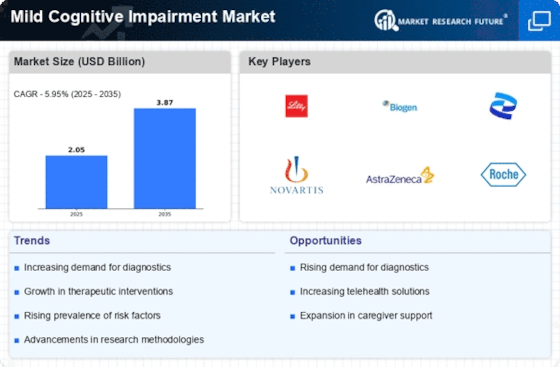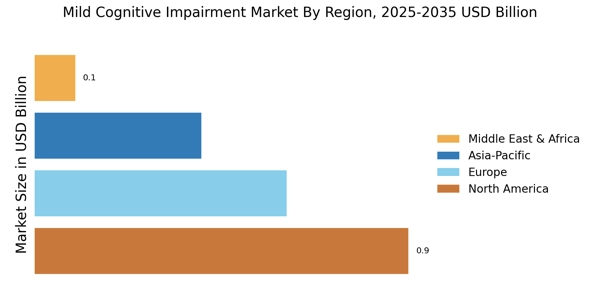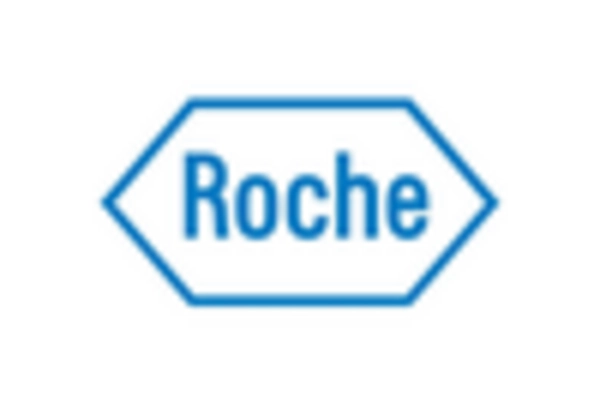Increased Focus on Mental Health
The heightened focus on mental health and cognitive wellness is driving the Mild Cognitive Impairment Market. Societal attitudes towards mental health have evolved, leading to greater acceptance and understanding of cognitive disorders. This shift has resulted in increased funding for mental health initiatives and awareness campaigns aimed at educating the public about mild cognitive impairment. As awareness grows, more individuals are seeking evaluation and treatment for cognitive issues, which is likely to boost demand for services and products within the Mild Cognitive Impairment Market. Additionally, healthcare providers are prioritizing mental health as a critical component of overall health, further propelling the market forward.
Aging Population and Rising Incidence
The aging population is a primary driver of the Mild Cognitive Impairment Market. As individuals age, the prevalence of cognitive decline increases, with studies indicating that approximately 15 to 20% of older adults experience mild cognitive impairment. This demographic shift is expected to continue, leading to a higher demand for diagnostic and therapeutic solutions within the Mild Cognitive Impairment Market. Furthermore, the World Health Organization projects that the number of people aged 60 years and older will double from 12% to 22% by 2050, further emphasizing the need for effective management strategies for cognitive health. Consequently, healthcare systems are increasingly focusing on early detection and intervention, which could potentially enhance the quality of life for affected individuals.
Advancements in Neuroimaging Techniques
Recent advancements in neuroimaging techniques are significantly influencing the Mild Cognitive Impairment Market. Technologies such as MRI and PET scans have improved the ability to detect early signs of cognitive decline, allowing for timely diagnosis and intervention. These innovations not only enhance the accuracy of assessments but also facilitate the differentiation between mild cognitive impairment and other neurodegenerative disorders. As a result, healthcare providers are more equipped to tailor treatment plans to individual needs, which is crucial in managing mild cognitive impairment effectively. The increasing adoption of these advanced imaging modalities is likely to drive market growth, as they become integral to clinical practice and research in the Mild Cognitive Impairment Market.
Integration of Digital Health Solutions
The integration of digital health solutions is emerging as a transformative driver in the Mild Cognitive Impairment Market. Telehealth platforms and mobile applications are increasingly being utilized to monitor cognitive health and provide support for individuals with mild cognitive impairment. These digital tools offer convenient access to healthcare professionals and resources, enabling timely interventions and ongoing management of cognitive health. Moreover, the use of artificial intelligence and machine learning in these solutions is enhancing the ability to analyze cognitive data, leading to more personalized care. As the adoption of digital health solutions continues to rise, it is expected to significantly impact the Mild Cognitive Impairment Market, improving accessibility and patient engagement.
Growing Investment in Research and Development
Investment in research and development is a critical driver of the Mild Cognitive Impairment Market. Pharmaceutical companies and research institutions are increasingly allocating resources to explore novel therapeutic options and interventions for mild cognitive impairment. This trend is evidenced by the rising number of clinical trials aimed at evaluating new drugs and treatment modalities. According to recent data, the number of clinical trials focused on cognitive impairment has seen a substantial increase, reflecting a growing recognition of the condition's impact on public health. As these investments yield promising results, they are likely to lead to the introduction of innovative therapies, thereby expanding the Mild Cognitive Impairment Market and improving patient outcomes.

















